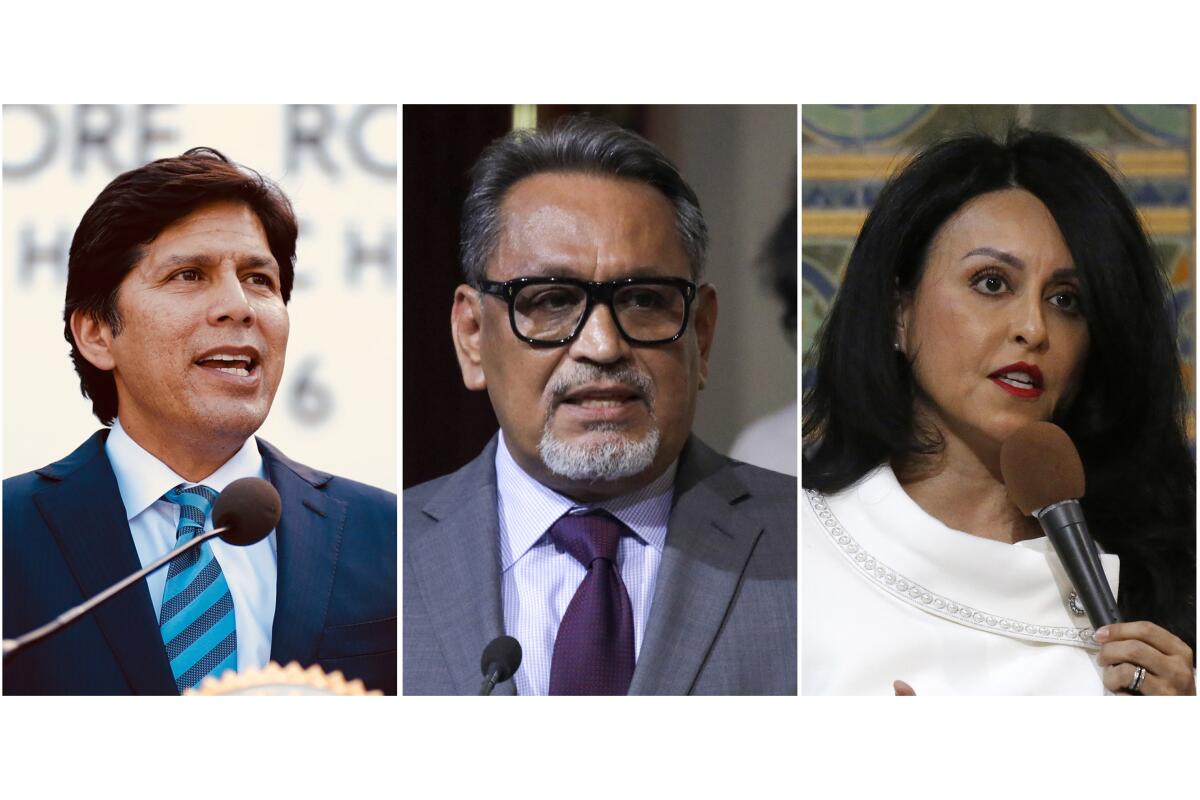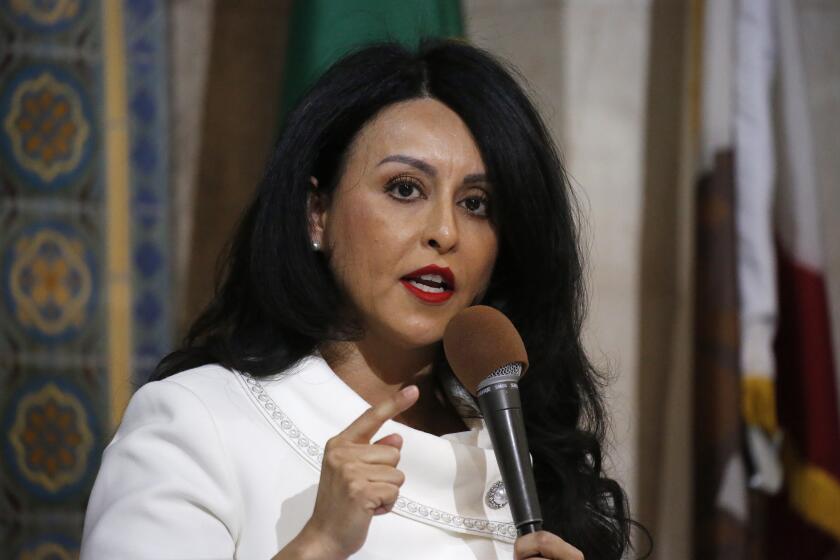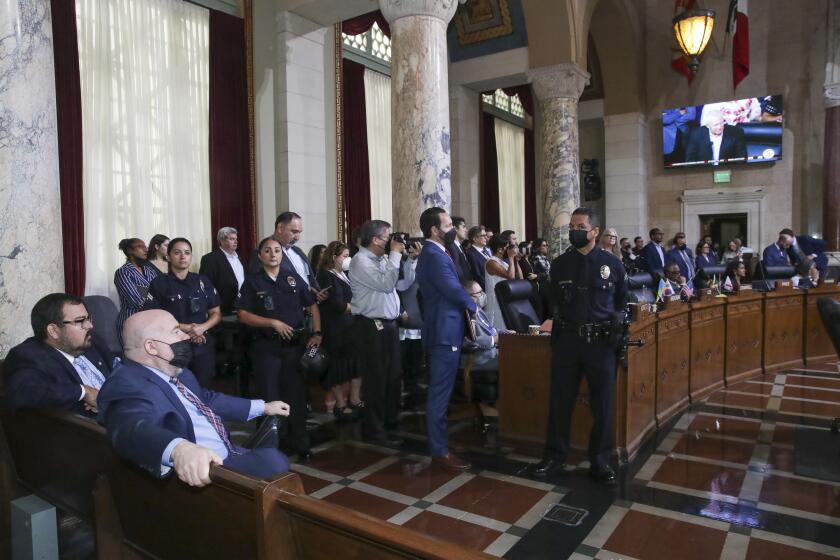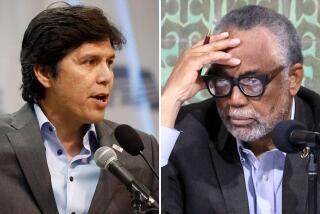Who will fill Nury Martinez’s council seat, and will there be a special election?

Former Los Angeles City Council President Nury Martinez resigned from Los Angeles City Council on Wednesday afternoon. The move came amid mounting pressures from all corners of politics, with President Biden, community activists and many of her council colleagues weighing in.
In a surreptitiously recorded conversation from October 2021, Martinez made racist remarks and insulted various elected officials while speaking with Councilmembers Kevin de León and Gil Cedillo, as well as Los Angeles County Federation of Labor President Ron Herrera. Herrera stepped down from his powerful position Monday, but De León and Cedillo have yet to step down from their council seats.
For the record:
2:43 p.m. Oct. 13, 2022An earlier version said a runoff special election would follow about 70 days after a primary. A runoff would probably be conducted about 85 days after a primary, based on general county procedure.
Martinez’s departure will lead to a special election, but many questions remain about what comes next for the City Council.
What happens next for Martinez’s seat?
Dan Halden, spokesperson for acting Council President Mitch O’Farrell, said O’Farrell will designate the office of the chief legislative analyst, which advises the council on policy matters, as the nonvoting caretaker of Martinez’s vacant seat.
That process has been relatively common immediately following a vacancy at City Hall. The council would then have to decide whether to appoint a temporary replacement or leave the district without a voting member until there is a special election.
There will eventually be a special election to fill the remainder of Martinez’s term, which ends in December 2024. But that wouldn’t happen until spring 2023 at the earliest.
“It is with a broken heart that I resign my seat for Council District 6,” Nury Martinez wrote in a statement.
What is a nonvoting caretaker?
A caretaker is exactly what it sounds like: someone who takes care of the council office and essentially keeps it running while steering clear of broad policy decisions.
“The way I describe it is it’s like a business manager,” Assistant Chief Legislative Analyst Avak Keotahian said. “You take care of business, you pay the bills … you supervise the staff, you make sure that all the constituent requests and calls are answered and processed, you monitor land use decisions in the district.”
Keotahian is something of an expert on this particular role, having served as a caretaker a dozen times during his more than four decades at City Hall.
What about appointing a temporary voting member?
A voting member could also be appointed to fill Martinez’ seat before a special election is held. Such a move would require a vote of the City Council.
The council approved Heather Hutt’s appointment last month to serve as the interim replacement for suspended Councilmember Mark Ridley-Thomas.
What if Cedillo and De León don’t resign? Can they be suspended or removed?
The short answer is no. The City Charter has a provision for councilmembers to suspend an elected officer only if they are awaiting trial in criminal proceedings, as was the case with former Councilmember Jose Huizar and Ridley-Thomas.
Councilmembers can be removed in rare situations, but it’s unlikely that any could apply in this scenario.
Short of him resigning, a recall election would likely be the only way to remove De León from office.
Cedillo does not have enough time left on his term to qualify for recall proceedings, according to city rules.
Should Cedillo resign, Councilmember Paul Krekorian said, he would support immediately swearing in Councilmember-elect Eunisses Hernandez, who beat Cedillo in the June election and is slated to take office in December.
The L.A. City Council members’ secret meeting was ugly. But it probably didn’t violate the Brown Act
L.A. council members’ secret meeting may not have been illegal. The only meetings covered by the Brown Act are those where a majority is present.
How does a special election work?
The City Council has to vote to call a special election. Should it choose to move forward immediately, a councilmember probably would introduce a motion to call a special election at Friday’s council meeting, with it returning for a vote the following Friday. (It’s theoretically possible that both steps could happen this Friday, though there might be some procedural issues with such a move.)
A primary election would be held roughly 150 to 160 days after the council calls a special election, City Clerk Holly Wolcott said. A runoff would probably be conducted about 85 days after a primary, based on general county procedure.
A late March 2023 primary followed by a mid-June runoff is likely the earliest voters could decide on the next occupant of Martinez’s seat. If someone gets more than 50% of the vote in the primary, the race will be decided without a runoff election.
A new councilmember typically takes office relatively quickly following a special election. Martinez won her seat in a 2013 special election and took office about 10 days later.
Would both special elections be held at the same time if De León also resigns?
That’s a possibility.
Wolcott said that she didn’t think there would be any financial benefit to holding the special elections concurrently, should De León also resign.
But, she said, there might be a messaging benefit to holding the elections at the same time, particularly in regard to voter outreach and awareness.
The city clerk’s office has requested a tailored special election cost estimate from the Los Angeles County Registrar-Recorder/County Clerk, spokesperson Josué Marcus said.
The last estimate his office received in February for a special council district election put the cost at roughly $3 million for both the primary and runoff, though a new estimate could differ. The February estimate is for the cost of holding just one election, not two.
Is there any precedent for this?
In a word, no.
“There’s no precedent for multiple councilmembers resigning [at once] that I’m aware of, not in my adult lifetime,” said Zev Yaroslavsky, a former city councilman and county supervisor and director of the Los Angeles Initiative at the UCLA Luskin School of Public Affairs. “But this whole crisis is without precedent.”
Individual councilmembers, however, have resigned. The last councilmember to resign was Mitchell Englander, who left his post two years early in 2018 to take a job with a sports and entertainment firm. A special election, won by John Lee, was held to fill Englander’s seat. (Englander later served prison time after being convicted in a sprawling City Hall corruption case that also produced felony charges against Huizar.)
More to Read
Sign up for Essential California
The most important California stories and recommendations in your inbox every morning.
You may occasionally receive promotional content from the Los Angeles Times.













